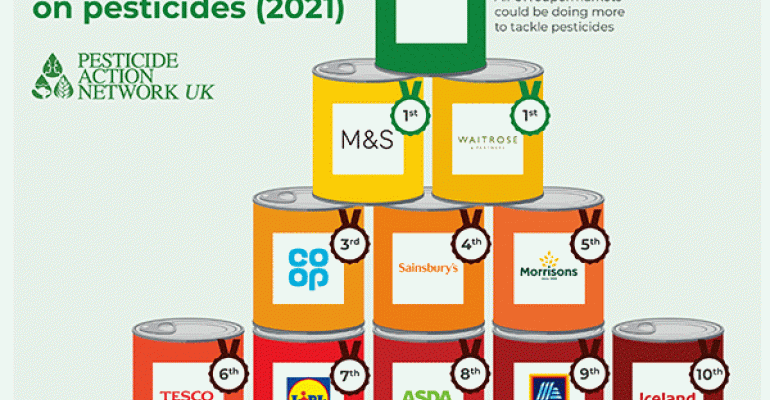High-end supermarkets are doing more to tackle and reduce pesticide use in their supply chains than budget chains, a new report has been found.
Waitrose and M&S topped the ranking by the Pesticide Action Network (PAN UK), which assesses 10 supermarkets against eight criteria related to pesticides, including what support they provide to their suppliers to use non-chemical alternatives.
Co-op and Sainsbury’s came close behind, followed by Morrisons, Tesco and Asda, while discounters Lidl, Aldi and Iceland came towards the bottom of the list.
“While our ranking reveals that some supermarkets are doing much better than others, we found that they could all be doing more to phase out the most dangerous pesticides,” said Josie Cohen, of PAN UK.
“While some of these chemicals are still used in the UK, many have been banned because of their impact on human health and the environment. But they are still allowed in many other countries where our food is grown, and where they routinely poison workers and wildlife and contaminate the natural environment.”
PAN UK also assessed transparency in what supermarkets are doing to tackle pesticides, as well as the presence of chemicals that are banned in the UK but still used overseas, such as neonicotinoids, which are banned in Europe for toxicity to bees, but still used elsewhere and therefore present in imported foods.
M&S and Co-op were recognized as the only two supermarkets who publish information around residue testing on food, which all supermarkets conduct to check pesticide levels don’t exceed legal limits.

Customers of the other eight supermarkets have no way of finding out which specific food items contain the most residues, making it impossible for them to make shopping decisions aimed at avoiding pesticides in their diets (other than choosing organic), PAN UK said.
Six of the top ten supermarkets (Asda, Aldi, Lidl, Morrisons, Sainsbury’s and Tesco) continue to sell high-risk pesticide products (such as weedkillers), while Co-op and Waitrose both said they will stop selling pesticides in 2021.
As well as those toxic to wildlife and insects, the list also monitored the use of Highly Hazardous Pesticides, which includes pesticides that are acutely toxic and can cause serious harm to farmers and workers after just a single instance of exposure, and found they are present. in all ten supermarket supply chains.
It also includes pesticides which have been linked to a range of chronic diseases including cancer, birth defects and developmental disorders.
“If we are to have any chance of reversing the current biodiversity and public health crises, then all supermarkets need to step up and do more to prevent pesticide-related harms,” added Cohen.


